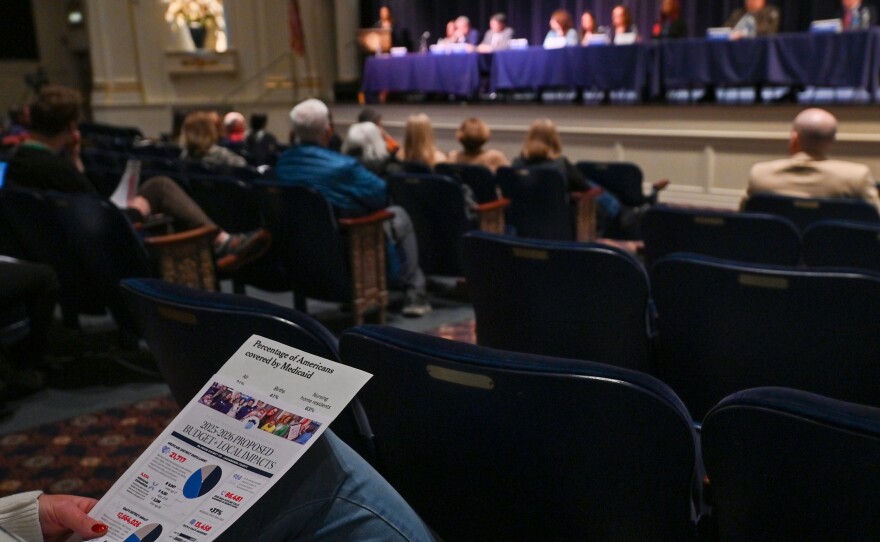Nicole Sekelsky escaped an abusive marriage. Later that week, she was diagnosed with a uterine cyst that required an operation. Through her divorce she lost her health insurance for herself and her children.
She credits Medicaid with saving her life.

Sekelsky became a patient of The Wright Center and later, an employee.
“I will always be eternally grateful [that] medical assistance itself covered my surgery. I did not have to try to figure out ways to sell my house or sell furniture so that I could afford that. I did not have to try to figure out how to come up with $140 a week for a child's therapy session to help the next generation recover from trauma. I will never have to worry about having to pay back thousands of dollars that went towards that care because it was used properly,” she said.
Sekelsky joined a panel of local healthcare providers and legislators on Monday night for a town hall on Medicare and Medicaid. The goal of the panel was to inform the audience about how the programs impact their organizations’ operations and talk about what would happen should they see any cuts.
Rep. Bridget Kosierowski (D-Waverly) organized the event.
Featured healthcare speakers included The Wright Center’s Dr. Linda Thomas-Hemak, Maternal and Family Health Services’ (MFHS) Maria Montoro Edwards, Scranton Primary Health Care Center’s Joseph Hollander and Allied Services’ James Cooney.
Other legislators included Reps. Kyle Donahue (D-Moosic) and Jim Haddock (D- Pittston Twp.).
The panel emphasized that any proposed cuts to the programs are not yet reality. However, they wanted to showcase the importance of the programs to the operations of the work that they do while putting a human face to the programs with stories like Sekelsky's.
Mounting concerns
Concerns have been rising about the stability of programs like Medicare and Medicaid as President Donald Trump slashes federal funding.
According to KFF, more than 3.1 million Pennsylvanians are covered by Medicaid. That’s roughly 21% of the state’s population. KFF found that there were nearly 3 million Medicare beneficiaries in the Commonwealth in 2024.

Medicare is a federal program providing health insurance for Americans 65 and older, and some people under 65 with certain disabilities or conditions. Medicaid offers health coverage for individuals with limited income and resources and is jointly funded by the state and federal governments.
The legislators present at the event said misinformation or misunderstandings are significant when it comes to the two programs.
“People don't understand the Medicaid system,” Donahue said. “I've had conversations with constituents just over the last few weeks where you bring up potential cuts to Medicaid, and they'll say, ‘I don't use Medicaid. I'm on medical assistance.’ Well, they're the same thing. It's trying to get that education out to people on how our healthcare system is interconnected.”
Political landscape
All of Pennsylvania’s Republican congressmen voted for a house resolution that outlined cutting $880 million from the House Energy and Commerce Committee, which oversees Medicaid. While Medicaid and Medicare were not specifically mentioned in that resolution, advocates fear that $880 million will not be reached without taking from Medicaid.
Freshman congressman Rob Bresnahan said in a statement before the vote, “If a bill is put in front of me that guts the benefits my neighbors rely on, I will not vote for it.”
He did vote for the house resolution that may do just that. He defended his vote, saying in a Facebook post, “Tonight's vote was just a procedural step to start federal budget negotiations and does NOT change any current laws. I will fight to protect working-class families in Northeastern Pennsylvania and stand with President Trump in opposing gutting Medicaid. My position on this has not and will not change.”

'Enough with the shock and awe'
The panel said many myths about social programs like Medicaid and Medicare have been floating around. They see lawmakers falling for those myths, which they fear could lead to cuts.
The doctors agreed they had never encountered Medicaid fraud.
“There's a lot of myths that people are getting a benefit that they don't need,” Thomas- Hemak said. “More than 60% of the population that I deal with come in with medical assistance. People come through a really vulnerable space where they're dependent on Medicaid. Then they rise up and they're grateful for what the system has done for them, and they can pass it forward.”
They want to cut fraudulent and wasteful spending out of the federal government. But as professionals who interact with the systems everyday, they do not believe there is widespread abuse within them.
“None of us are against cutting out fraud, waste and abuse,” Hollander said. “But the fraud, waste and abuse does not account for the numbers that they're speaking of. Enough with the shock and awe, we need to stand up and say we can't have these programs cut.”
'We can barely do what we do every day'
The panel agreed that the growing national debt is a problem.
However, they do not think cutting funding to healthcare is the solution.
“These are essential services, and they are not the place where they're going to find those big numbers, because we're the smallest part of the budget, doing the most essential things,” said Thomas-Hemak.
Allied Services’ senior vice president James Cooney explained that Allied’s operations rely on Medicaid payments.
“In total, 1/3 of the services that we provide to the community are funded by the Medicaid program,” Cooney said.
Even with Medicaid payments, Allied still operates on a deficit.

“We face a Medicaid system in Pennsylvania that continues to pay us just 83% of what we need to spend to take care of residents every day in our facility,” he continued.
He noted that many skilled nursing facilities have closed since the pandemic. Many of them are high quality facilities rated four or five stars by the Centers for Medicaid and Medicare Services that could no longer afford to operate.
As with skilled nursing, other panelists already deal with a lack of resources.
Fellow panelists nodded their agreement when Thomas-Hemak said, “Primary care is over- responsibilitied and under-resourced. So there are no possible cuts. We can barely do what we do every day with the resources that we're currently given.”
Straining the system
MFHS’s Montoro Edwards called community healthcare organizations like her own a “safety net” of care in the region.
“We need to consider the interconnectedness of these programs,” Montoro Edwards said. “Making access to WIC more difficult means fewer families will have access to WIC’s life changing benefits and protective factors, including reduced infant mortality, better birth outcomes, improved academic performance and a better nutrition status overall for children.”
“If Congress moves forward with cuts to Medicaid or snap, families will not only lose access to food and healthcare, but they'll face unnecessary barriers to WIC, and this will leave families struggling with rising food insecurity. Research has shown that when individuals lose their SNAP benefits, Medicaid spending actually increases,” Montoro Edwards continued.
A disturbance to any of those programs can cause a ripple effect.
“If [healthcare providers are] not getting any sort of reimbursement for that, it's going to drive up the cost for everybody else,” Donahue said. “We're in this together, and that's basically what this comes down to. Even though [you] may not be affected by these programs, it affects us all.”
Kosierowski fears a cut to Medicaid would take away the access to preventative care. As an operating room nurse, she knows the importance of preventative care.
“I took care of a lot of patients that were having a diagnosis of colon cancer, diagnosis of breast cancer,” Kosierowski said. “Stage four on arrival, and it was because they did not have access to health care. They didn't have that colonoscopy, they didn't have that mammogram. [The] Affordable Care Act has allowed 750,000 Pennsylvania's access to health care so that they can take care of themselves and their family.”
The lack of preventative care would strain the region's already overwhelmed hospitals.
“Our emergency departments [and hospitals] are already overcrowded and overburdened,” Hollander said. “Common sense tells us these numbers will only swell if people can't afford to schedule a visit with their primary care providers.”
Moving forward
The panel ended with the reminder that cuts to the programs are just proposed as of now.
They don’t want to use conversations like the panel discussion to cause mass hysteria. They just want to keep people in the loop regarding what is going on and how they can protect themselves should something happen.
“We should not be presuming that the extreme versions of what is being said is going down because it's not true, and that creates a lot of collective disturbances that are then a distraction to the real issues going down. We have to keep people educated,” Thomas- Hemak said.
The healthcare providers hope legislators will consider the nearly two-hour conversation when thinking about how to best serve their constituents.
“We ask all of you in Harrisburg and Washington to take a hard look and please help us provide care to these people who deserve that care,” Hollander said.
They encouraged the audience to put pressure on their elected officials with phone calls and messages urging them to vote against cuts to the programs.
“The people in Washington work for us, and they cannot cut essential services when they're funded by our taxpayer dollars. We have to have a rebuttal to how we feel treated,” Thomas-Hemak said.











